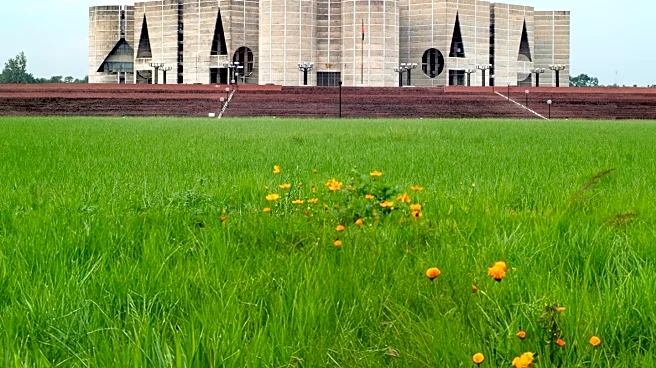What's Happening?
UNICEF reports that over half of the one million Rohingya refugees in Cox's Bazar, Bangladesh, are under 18. These children, having fled persecution from Myanmar, find solace in play within refugee camps. Organizations like BRAC have established playrooms and activities to help children cope with trauma. Play is not merely a pastime but a crucial tool for managing stress and regaining a sense of normalcy. Children engage in games like Kabbiya, a traditional call-and-response activity, which fosters a sense of belonging and community. Despite the harsh conditions, play provides a lifeline for these young refugees, helping them express emotions and find joy amidst adversity.
Why It's Important?
The emphasis on play for Rohingya children in refugee camps underscores the critical role of mental health support in humanitarian crises. Play helps children process trauma and build resilience, which is essential for their development and well-being. The initiative by organizations like BRAC to create safe spaces for play highlights the importance of addressing psychological needs alongside physical ones in refugee settings. This approach can influence future humanitarian strategies, ensuring that mental health is prioritized in crisis response. The ability of play to foster community and cultural connection also aids in preserving identity and providing stability for displaced populations.
What's Next?
Continued support and expansion of play-based initiatives in refugee camps are likely, as organizations recognize the benefits of such programs. Stakeholders may focus on integrating mental health support with educational and recreational activities to provide comprehensive care for refugee children. There may be increased advocacy for funding and resources to sustain these programs, emphasizing their role in long-term recovery and integration efforts. Collaboration between international organizations and local communities could enhance the effectiveness and reach of these initiatives, ensuring that more children can access the benefits of play.
Beyond the Headlines
The focus on play in refugee camps highlights broader ethical considerations in humanitarian aid, such as the need to address psychological trauma and support emotional well-being. It raises questions about the long-term impact of displacement on children and the importance of preserving cultural practices in refugee settings. The initiative also reflects a shift towards holistic approaches in crisis management, recognizing the interconnectedness of physical, mental, and social health. This development could influence global policies on refugee care, advocating for comprehensive strategies that prioritize mental health alongside basic needs.










